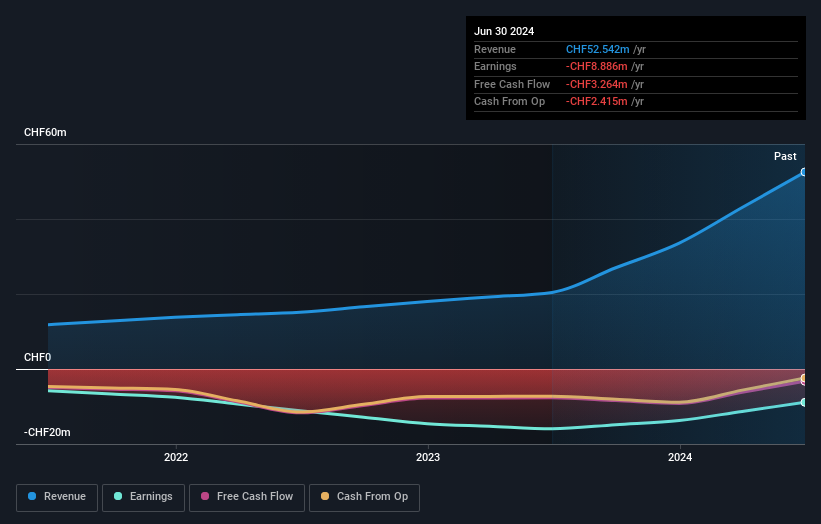- Switzerland
- /
- Biotech
- /
- SWX:KURN
Kuros Biosciences AG (VTX:KURN) surges 16%; retail investors who own 50% shares profited along with insiders

Key Insights
- Kuros Biosciences' significant retail investors ownership suggests that the key decisions are influenced by shareholders from the larger public
- 50% of the business is held by the top 20 shareholders
- 24% of Kuros Biosciences is held by insiders
A look at the shareholders of Kuros Biosciences AG (VTX:KURN) can tell us which group is most powerful. The group holding the most number of shares in the company, around 50% to be precise, is retail investors. That is, the group stands to benefit the most if the stock rises (or lose the most if there is a downturn).
Following a 16% increase in the stock price last week, retail investors profited the most, but insiders who own 24% stock also stood to gain from the increase.
In the chart below, we zoom in on the different ownership groups of Kuros Biosciences.
Check out our latest analysis for Kuros Biosciences

What Does The Institutional Ownership Tell Us About Kuros Biosciences?
Institutional investors commonly compare their own returns to the returns of a commonly followed index. So they generally do consider buying larger companies that are included in the relevant benchmark index.
Kuros Biosciences already has institutions on the share registry. Indeed, they own a respectable stake in the company. This implies the analysts working for those institutions have looked at the stock and they like it. But just like anyone else, they could be wrong. It is not uncommon to see a big share price drop if two large institutional investors try to sell out of a stock at the same time. So it is worth checking the past earnings trajectory of Kuros Biosciences, (below). Of course, keep in mind that there are other factors to consider, too.

Kuros Biosciences is not owned by hedge funds. Looking at our data, we can see that the largest shareholder is C. Oomen with 22% of shares outstanding. The second and third largest shareholders are Hatstone Fund Services Limited and Global Fund Advisors Limited, Asset Management Arm, with an equal amount of shares to their name at 4.7%.
Our studies suggest that the top 20 shareholders collectively control less than half of the company's shares, meaning that the company's shares are widely disseminated and there is no dominant shareholder.
Researching institutional ownership is a good way to gauge and filter a stock's expected performance. The same can be achieved by studying analyst sentiments. We're not picking up on any analyst coverage of the stock at the moment, so the company is unlikely to be widely held.
Insider Ownership Of Kuros Biosciences
While the precise definition of an insider can be subjective, almost everyone considers board members to be insiders. The company management answer to the board and the latter should represent the interests of shareholders. Notably, sometimes top-level managers are on the board themselves.
I generally consider insider ownership to be a good thing. However, on some occasions it makes it more difficult for other shareholders to hold the board accountable for decisions.
Our most recent data indicates that insiders own a reasonable proportion of Kuros Biosciences AG. Insiders own CHF206m worth of shares in the CHF843m company. It is great to see insiders so invested in the business. It might be worth checking if those insiders have been buying recently.
General Public Ownership
The general public, mostly comprising of individual investors, collectively holds 50% of Kuros Biosciences shares. This size of ownership gives investors from the general public some collective power. They can and probably do influence decisions on executive compensation, dividend policies and proposed business acquisitions.
Private Company Ownership
Our data indicates that Private Companies hold 8.6%, of the company's shares. It's hard to draw any conclusions from this fact alone, so its worth looking into who owns those private companies. Sometimes insiders or other related parties have an interest in shares in a public company through a separate private company.
Next Steps:
While it is well worth considering the different groups that own a company, there are other factors that are even more important. Case in point: We've spotted 3 warning signs for Kuros Biosciences you should be aware of, and 2 of them can't be ignored.
Of course, you might find a fantastic investment by looking elsewhere. So take a peek at this free list of interesting companies.
NB: Figures in this article are calculated using data from the last twelve months, which refer to the 12-month period ending on the last date of the month the financial statement is dated. This may not be consistent with full year annual report figures.
Valuation is complex, but we're here to simplify it.
Discover if Kuros Biosciences might be undervalued or overvalued with our detailed analysis, featuring fair value estimates, potential risks, dividends, insider trades, and its financial condition.
Access Free AnalysisHave feedback on this article? Concerned about the content? Get in touch with us directly. Alternatively, email editorial-team (at) simplywallst.com.
This article by Simply Wall St is general in nature. We provide commentary based on historical data and analyst forecasts only using an unbiased methodology and our articles are not intended to be financial advice. It does not constitute a recommendation to buy or sell any stock, and does not take account of your objectives, or your financial situation. We aim to bring you long-term focused analysis driven by fundamental data. Note that our analysis may not factor in the latest price-sensitive company announcements or qualitative material. Simply Wall St has no position in any stocks mentioned.
About SWX:KURN
Kuros Biosciences
A biopharmaceutical company, engages in the commercialization and development for tissue repair and bone regeneration in the United States, the European Union, and internationally.
Flawless balance sheet very low.

